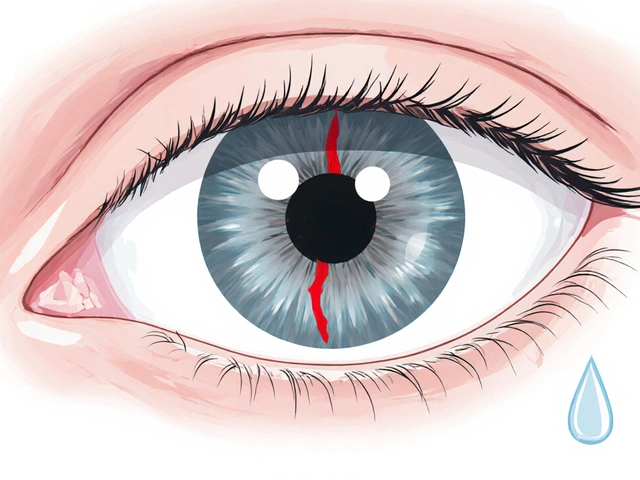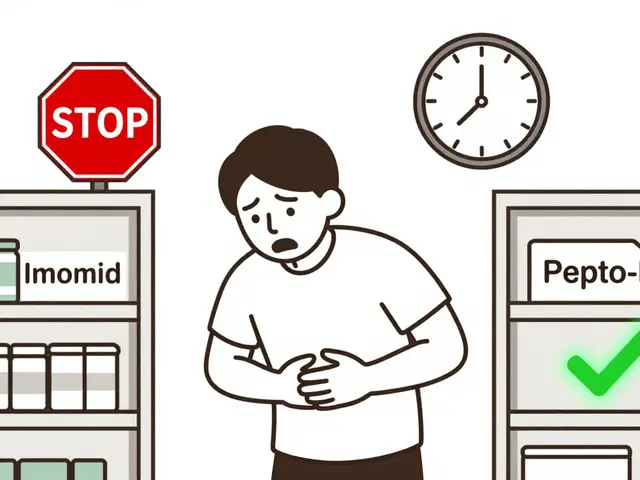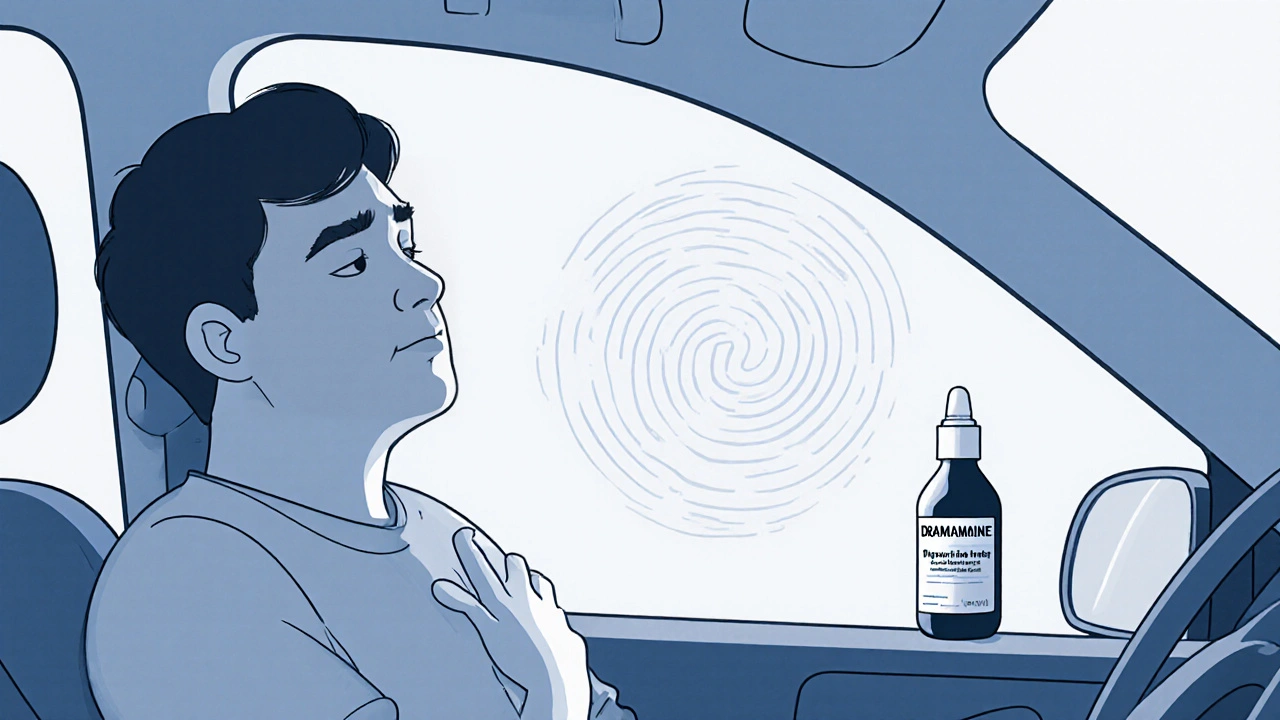Motion Sickness Medication Selector
Find Your Perfect Motion Sickness Medication
When a long car ride or a choppy flight makes your stomach feel like a washing machine, you reach for something that stops the nausea fast. Dramamine (Dimenhydrinate) is a first‑generation antihistamine specifically marketed for motion‑induced vertigo and nausea. It’s been on pharmacy shelves for decades, but dozens of alternatives now promise the same relief with fewer drowsy side effects. This guide breaks down the chemistry, dosing, onset, and real‑world pros and cons of the big players, so you can pick the right option for your next trip, hike, or sea adventure.
Why Compare? The Jobs You Want Done
- Identify which medication works fastest for sudden motion sickness.
- Find a choice that keeps you alert when you need to drive or operate equipment.
- Understand dosing differences for adults, kids, and seniors.
- Weigh natural options against synthetic drugs.
- Spot potential drug interactions or health warnings before you buy.
How Dramamine Works - The Science in Plain English
Dramamine’s active ingredient, Dimenhydrinate, blocks histamine H1 receptors in the brain’s vestibular nuclei. Histamine is a neurotransmitter that, when overstimulated by motion, tells the brain you’re moving when you’re not, causing nausea and dizziness. By dampening this signal, Dimenhydrinate reduces the mismatch between what your inner ear senses and what your eyes see.
The drug also has anticholinergic properties, meaning it mildly interferes with acetylcholine, another messenger involved in balance. This double‑action is why many people feel a bit drowsy after a dose - the same pathways that regulate alertness are being turned down.
Top Alternatives on the Market
Below are the most common motion‑sickness remedies you’ll encounter, each with a distinct pharmacologic class.
- Meclizine - a second‑generation antihistamine marketed as Antivert or Bonine.
- Cyclizine - an older antihistamine sold as Marezine.
- Scopolamine - an anticholinergic delivered via a transdermal patch (Transderm‑Scop).
- Ginger - a natural root used in capsules, teas, or chews.
Side‑Effect Profile at a Glance
| Medication | Class | Typical adult dose | Onset | Duration | Common side effects |
|---|---|---|---|---|---|
| Dramamine (Dimenhydrinate) | First‑gen antihistamine | 50‑100 mg every 4‑6 h (max 400 mg/24 h) | 15‑30 min | 4‑6 h | Drowsiness, dry mouth, blurred vision |
| Meclizine | Second‑gen antihistamine | 25‑50 mg once daily | 30‑60 min | Up to 24 h | Mild drowsiness, headache |
| Cyclizine | First‑gen antihistamine | 50 mg 30 min before travel | 15‑30 min | 4‑6 h | Drowsiness, constipation |
| Scopolamine (patch) | Anticholinergic | d>1 patch (1.5 mg) 1‑2 h before travel | 1‑2 h | 72 h (continuous) | Dry mouth, visual blur, confusion (rare) |
| Ginger | Natural anti‑emetic | 250‑500 mg 4 h before travel | 30‑60 min | 4‑6 h | Heartburn, mild mouth irritation |
Choosing the Right Option for You
Meclizine is often the go‑to for travelers who need a once‑daily pill that keeps them awake during long drives. Its second‑generation antihistamine design cuts the drowsiness in half compared with Dramamine, while still delivering reliable nausea control.
If you’re battling sea‑sickness on a multi‑day cruise, a Scopolamine patch can be a game‑changer. One patch sticks to your behind‑ear area and releases the drug slowly, so you don’t have to remember a dosing schedule. Just be aware of the dry‑mouth side effect, which can be mitigated with sugar‑free gum.
For hikers who want a non‑pharmaceutical option, fresh ginger tea or ginger capsules can be surprisingly effective. Studies from the University of Helsinki (2023) showed that 500 mg of ginger reduced motion‑induced nausea by 40 % compared with placebo, without any sedation.
When the priority is rapid onset - say you feel queasy halfway through a road trip - Cyclizine hits the bloodstream fastest. Its 15‑minute onset makes it the preferred “quick fix” in many emergency kits.
Special Populations: Kids, Seniors, and Pregnant Travelers
Children under 12 should avoid Dimenhydrinate unless a pediatrician prescribes it, because the drowsiness can be pronounced. Meclizine has a pediatric formulation (6‑12 mg) approved for ages 6 and up, making it a safer bet for families.
Seniors often metabolize antihistamines more slowly, so lower doses of Dramamine (25 mg) or switching to Meclizine can reduce the risk of falls caused by dizziness. Scopolamine patches are contraindicated in patients with glaucoma or Parkinson’s disease because of their anticholinergic load.
Pregnant travelers should steer clear of synthetic antihistamines unless a doctor says otherwise. Ginger, in moderate amounts, is generally considered safe during pregnancy and can be used as a nausea‑relief supplement.
Potential Interactions and Contra‑Indications
Because Dimenhydrinate and other antihistamines have sedating properties, pairing them with alcohol, benzodiazepines, or other CNS depressants amplifies drowsiness. If you’re on a blood pressure medication like beta‑blockers, check with your pharmacist - some antihistamines can modestly raise heart rate.
Scopolamine’s anticholinergic action can interact with medications that also increase anticholinergic burden, such as certain antidepressants (tricyclics) and antipsychotics. A quick medication review with your doctor can prevent unwanted side effects.

Quick Takeaways
- Dramamine provides fast relief but often causes drowsiness.
- Meclizine offers a longer‑acting, less‑sedating alternative for daily travelers.
- Cyclizine is the fastest‑acting over‑the‑counter tablet.
- Scopolamine patches are ideal for multi‑day voyages but require caution with eye‑related conditions.
- Ginger is a safe, natural choice for mild motion sickness, especially in pregnancy.
How to Store and Use Your Medication Effectively
- Keep tablets in a cool, dry place away from direct sunlight.
- Read the expiration date - antihistamines lose potency after 2 years.
- Take the dose with a full glass of water; avoid lying down for 30 minutes to speed absorption.
- If using a scopolamine patch, rotate the placement site each time you apply a new patch to reduce skin irritation.
- For ginger, store capsules in a sealed container to prevent moisture loss.
Frequently Asked Questions
Can I take Dramamine and alcohol together?
Mixing the two is not recommended. Both depress the central nervous system, which can lead to excessive drowsiness, impaired coordination, and a higher risk of accidents.
How long before travel should I take Meclizine?
Take the dose about one hour before you start moving. Its peak effect arrives around 2‑3 hours, providing coverage for a full day of travel.
Is ginger effective for severe sea‑sickness?
Ginger works best for mild to moderate nausea. In severe cases, a pharmaceutical antihistamine or scopolamine patch usually offers stronger relief.
Can I use a scopolamine patch if I wear glasses?
Yes, but place the patch on a hairless area behind the ear, not on the glasses’ arm. The medication does not affect vision unless you have pre‑existing eye conditions.
What’s the safest option for a pregnant traveler?
Ginger in moderate doses is generally regarded as safe during pregnancy. Always discuss any medication, even herbal, with your obstetrician before use.
Bottom Line: Match the Drug to Your Travel Style
If you value a quick, cheap over‑the‑counter solution and don’t mind a little sleepiness, reach for Dramamine. If you need all‑day coverage without feeling groggy, Meclizine is the better pick. For sea‑bound voyages lasting several days, a scopolamine patch gives nonstop protection. And when you’d rather avoid pills altogether, ginger offers a natural, mild alternative.
Knowing the trade‑offs lets you pack the right remedy the first time you push the boarding gate. Safe travels and steady seas!




Comments
13 Comments
junior garcia
I remember the first time I took Dramamine on a winding mountain road; the world seemed to pause, and the nausea vanished like a bad dream.
Dason Avery
That feeling is why I always keep a bottle in my glovebox 🧭✨. When the road rocks you, a quick dose of Dimenhydrinate can be the hero you didn’t know you needed. Just pop it 30 minutes before you hit the twists, and let the calm settle in. You’ll stay sharp, alert, and still have the energy to enjoy the scenery! 🌄🚗
Casey Morris
Indeed-one must acknowledge the pharmacodynamic intricacies, for the antihistaminic blockade does not merely "stop" nausea; it orchestrates a symphony of neuronal inhibition, thereby modulating vestibular input; consequently, the sedative side‑effect is an inevitable corollary of the drug's mechanism of action, albeit tolerable for most travelers.
Teya Arisa
Allow me to commend the thoroughness of this comparison; it provides a salient framework for selecting the appropriate anti‑emetic based on individual circumstances. Should one prioritize rapid onset, the cyclizine option merits consideration, whereas for extended voyages the scopolamine patch offers sustained coverage. It is prudent to weigh the anticholinergic burden, especially in geriatric patients.
Kester Strahan
Totally agree-though I’d add that the bioavailability of meclizine can vary with food intake; taking it on an empty stomach might delay peak plasma levels, which is why I always schedule my dose an hour before departure. Also, the term "first‑gen" vs "second‑gen" antihistamine is more marketing than science-both act on H1 receptors but differ in CNS penetration.
Amanda Vallery
Ginger is great for mild nausea, but it won’t stop severe seasick feelings.
Kathryn Rude
Honestly the only thing that matters is which one keeps you awake for the road🙂 it’s all about personal tolerance.
Lindy Hadebe
All these options sound the same to me just pick one and move on.
Ekeh Lynda
The evolution of motion‑sickness therapeutics reflects a broader trend in pharmacology toward balancing efficacy with quality of life. Early formulations of dimenhydrinate were prized for their rapid onset but condemned for inducing somnolence. Subsequent generations introduced meclizine, which, while slower to peak, offers a longer half‑life and reduced sedation. Cyclizine entered the market as a quick‑acting alternative, yet its side‑effect profile remains similar to that of its predecessor. Scopolamine patches revolutionized prophylaxis for maritime voyages, delivering drug over several days without the need for repeated dosing. Natural remedies such as ginger have resurfaced, driven by consumer demand for plant‑based interventions. Clinical trials continue to compare these agents head‑to‑head, focusing on parameters like onset time, duration, and adverse events. The heterogeneity of patient populations-children, elderly, pregnant women-necessitates nuanced dosing guidelines. Drug‑drug interactions, especially with CNS depressants, remain a critical consideration for prescribers. Regulatory agencies have updated labeling to reflect new safety data concerning anticholinergic load. Patient education plays a pivotal role in ensuring proper administration, especially with transdermal patches. In practice, clinicians must individualize therapy based on travel itinerary, comorbidities, and patient preference. Emerging research on vestibular modulation may soon yield novel compounds with fewer cognitive side effects. Until such breakthroughs occur, the comparative table remains an invaluable tool for travelers seeking optimal relief.
Mary Mundane
Meclizine’s once‑daily dosing is convenient for road trips.
Tammy Watkins
When advising patients, it is essential to consider both pharmacokinetic profiles and lifestyle demands. For a driver who must remain vigilant, a medication with minimal sedative properties, such as meclizine, is preferable. Conversely, for a cruise passenger with prolonged exposure to motion, the continuous delivery afforded by a scopolamine patch may be superior. Moreover, clinicians should assess for contraindications, including glaucoma or benign prostatic hyperplasia, before prescribing anticholinergics. It is also prudent to counsel patients on hydration and avoiding alcohol concomitantly, as synergistic CNS depression can exacerbate drowsiness. Ultimately, the choice hinges on balancing rapid symptom control against the risk of impairment.
Dawn Bengel
Our nation deserves the best-don’t settle for “generic” meds when you can get the premium anti‑nausea option that keeps you sharp for the homeland’s defense 🚩💪.
Doreen Collins
I totally get the struggle with motion sickness, and it’s awesome that you’ve laid out the pros and cons so clearly. For those of us who hate pills, ginger is a great fallback, but when you need something strong, I’d reach for a scopolamine patch and keep a bottle of meclizine handy just in case. Stay safe out there!
Write a comment